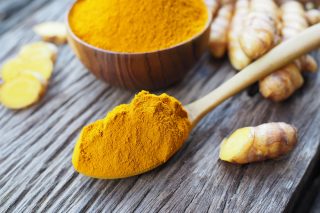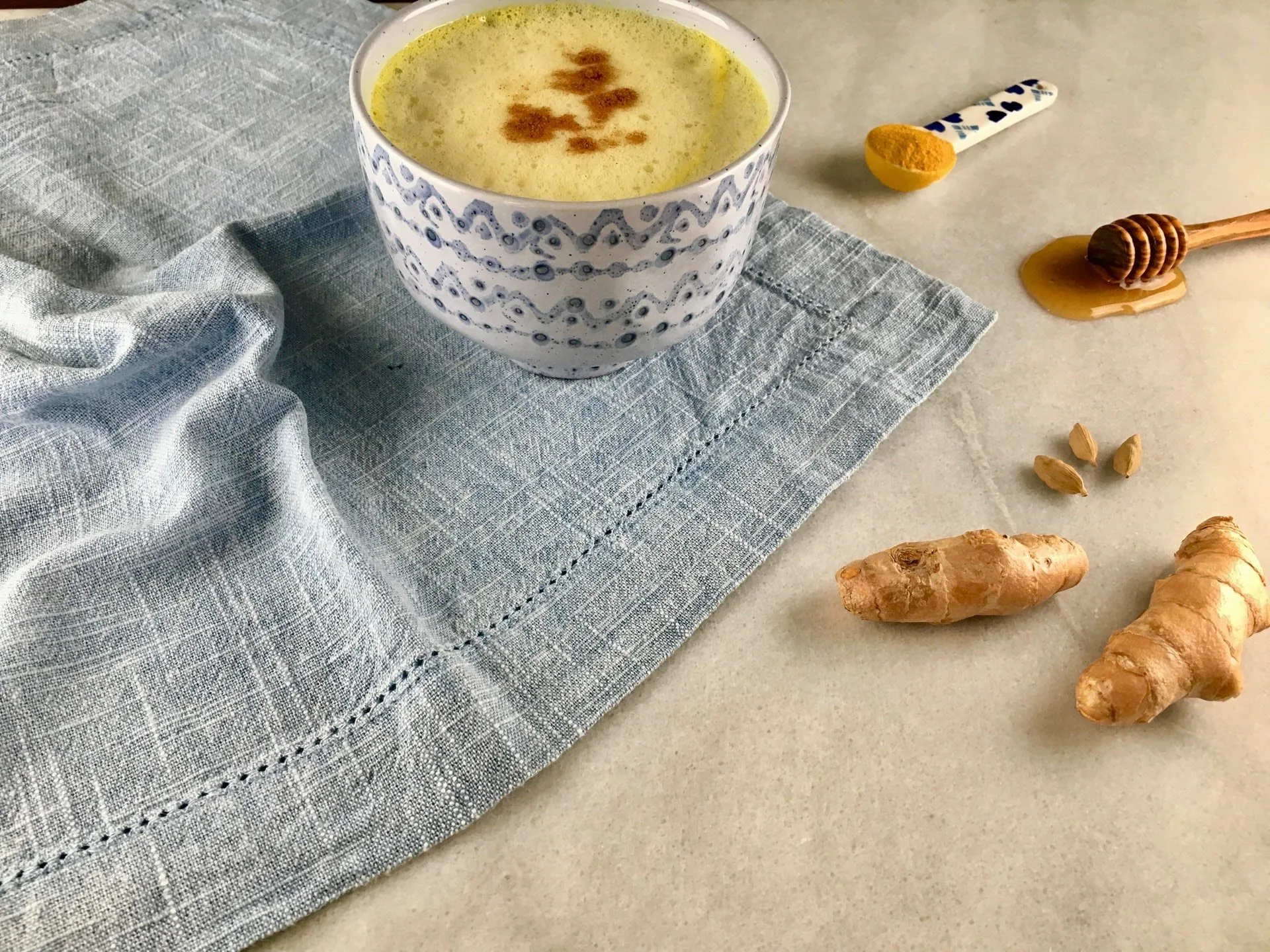Turmeric is a key ingredient in almost every Indian dish, probably because it’s so good for you. In Ayurveda, it’s used for its antioxidant, anti-inflammatory, antibacterial, anti-allergenic, digestive. As well as a diuretic, anti-fungal, anti-carcinogenic, anti-mutagenic properties. Wow! That’s a lot of power in one herb!
Turmeric milk (also known as golden milk or haldi doodh) has been used by mothers and grandmothers in India for centuries. It’s their go-to recipe for colds, congestion, headaches and sore throats. It even helps you get to sleep! Seriously.
Curcumin is a longevity compound
The most researched compound in turmeric is curcumin, which is thought to be responsible for most of its medicinal benefits. Curcumin helps the body build its natural defense mechanisms and heal naturally. It also stimulates our detoxification systems, which reduce toxins.
Here are Turmeric’s 7 brilliant health benefits
Turmeric does so much for our health. It’s one of the most amazing and well-researched herbs around. Here are seven reasons to consider adding some to your food and drinks every single day:
1. Builds a Stronger Immune System
Turmeric strengthens the immune system. Curcumin is a powerful antioxidant. This helps clean up free radicals that can damage cells and cause disease. Fewer free radicals means less oxidative stress. And that means a stronger immune system.
Researchers have also studied curcumin’s anti-viral and anti-bacterial properties. They believe it may act against powerful pathogens like the influenza virus, the hepatitis C virus, HIV and strains of staphylococcus, streptococcus, and pseudomonas.
2. Anti-inflammatory
Turmeric has anti-inflammatory properties. Inflammation is involved in most chronic conditions, including cardiovascular disease, Parkinson’s disease, Alzheimer’s disease, cancer, allergies, arthritis, and diabetes.
Research also shows that curcumin may alleviate the symptoms of arthritis, especially osteoarthritis.
3. Manage your metabolic syndrome
Turmeric may also help you to better manage metabolic syndrome. This is a cluster of risk factors that increase the risk of developing conditions such as cardiovascular disease, diabetes and strokes.
 4. Reduce depression
4. Reduce depression
Turmeric may help to prevent or reduce depression. Research suggests that chronic inflammation and depression may exacerbate one another; antioxidants like curcumin may help alleviate some symptoms of depression by fighting chronic inflammation.
5. Improves exercise recovery time
Turmeric may help in the management of exercise-induced soreness and inflammation, thereby improving both performance and recovery time.
6. A neuro-protectant
Studies have found that curcumin is especially effective as a neuro-protectant when combined with the omega-3 fatty acid DHA.
7. Improves digestion
Turmeric reduces the permeability of the gastrointestinal tract, and it may improve digestion. And just about anyone can get general wellness benefits from low doses of turmeric.

How to Get the Benefits of Turmeric
Curcumin is a relatively unstable molecule, which means it isn’t easily absorbed. This limits its potential medicinal benefits, so it’s important to improve absorption. Here are three ways to do that:
-
Use fresh black pepper
Piperine (a component of black pepper) can increase absorption by about 2000%. It’s important to use freshly ground pepper, so the piperine doesn’t lose its effectiveness.
-
Consume healthy fats
Curcumin is fat-soluble, so drinking turmeric with fat (such as cow’s milk, coconut milk or even coconut oil) increases absorption and bioavailability. So does cooking with healthy fats, such as coconut oil, ghee or olive oil.
-
Heat it
Heating enhances the overall antioxidant and anti-inflammatory properties of curcumin, and you don’t need to heat it for long (under 15 minutes). So it’s easy to improve absorption by making turmeric milk or adding it to curries and other recipes that use fats like coconut oil or ghee.
How to Make Turmeric Milk
You can include many delicious spices in your turmeric milk. Here’s the base of our favorite recipe:
- A cup of milk: We prefer a nut milk like almond, coconut or macadamia – but organic (or, at the very least, GMO-free) cow’s milk also works.
- ¼ teaspoon turmeric powder: Our turmeric powder is certified organic and has no unwanted additives. This is important, because turmeric is a bio accumulator. That means it will take in even more pesticides, heavy metals and other toxins than most plants.
- ½ teaspoon cinnamon powder: We use organic Ceylon cinnamon, but regular (cassia) cinnamon will also work. Regular cinnamon has a stronger flavor, so you may want to use less.
- ¼ teaspoon ginger powder: You can use fresh ginger as well, replacing ¼ teaspoon of powder with a one-inch knob of ginger. If you use fresh ingredients you’ll want to strain it before drinking.
- A dash of freshly ground black pepper: Don’t leave this out if you want the benefits of turmeric. If it’s too bitter or spicy for you, adjust the sweetener at the end. Adding a dash of cayenne or chili pepper can also help with the taste.
- Sweetener: Add maple syrup, coconut sugar or another natural sweetener of your choice. If you use honey, be careful. According to Ayurveda, honey produces toxins when heated. So use only raw honey and wait for the milk to cool down before adding it. Don’t let it get cold, though, or the honey won’t dissolve.
You can add other ingredients, including these popular choices:
- ½ teaspoon vanilla extract
- ½ teaspoon nutmeg
- ½ teaspoon cardamom
- A pinch of Himalayan salt
Mixing Instructions
If you’re using fresh ingredients, put everything except the sweetener in a blender with the milk. You want your drink to be smooth.
Add the blend to a saucepan and simmer on a low to medium heat for 5 minutes. Don’t boil. Strain again if required.
Add sweeteners and anything else that will make it perfect for you. Mix it thoroughly and pour into a mug.
Note: Turmeric stains can be hard to remove, so clean your containers and utensils, as well as any spills, as quickly as possible.
The Bottom Line
Adding turmeric to your food or drinks is a great way to receive its many health benefits. One or two cups of golden milk a day is plenty; the key is to use it in moderation over time.
The FDA has classified turmeric as GRAS (Generally Recognized as Safe). But like most medicinal herbs and spices, turmeric may have adverse effects in high doses or if you’re on certain medications (especially blood thinners). If you intend to use it to treat a specific condition, or if you plan to consume more than a teaspoon or so a day, it’s important to consult your health practitioner.
Read more
If you enjoy reading about turmeric milk, then read about these 12 teas to boost your immunity and longevity. Click here.



![women [longevity live]](https://longevitylive.com/wp-content/uploads/2020/01/photo-of-women-walking-down-the-street-1116984-100x100.jpg)










